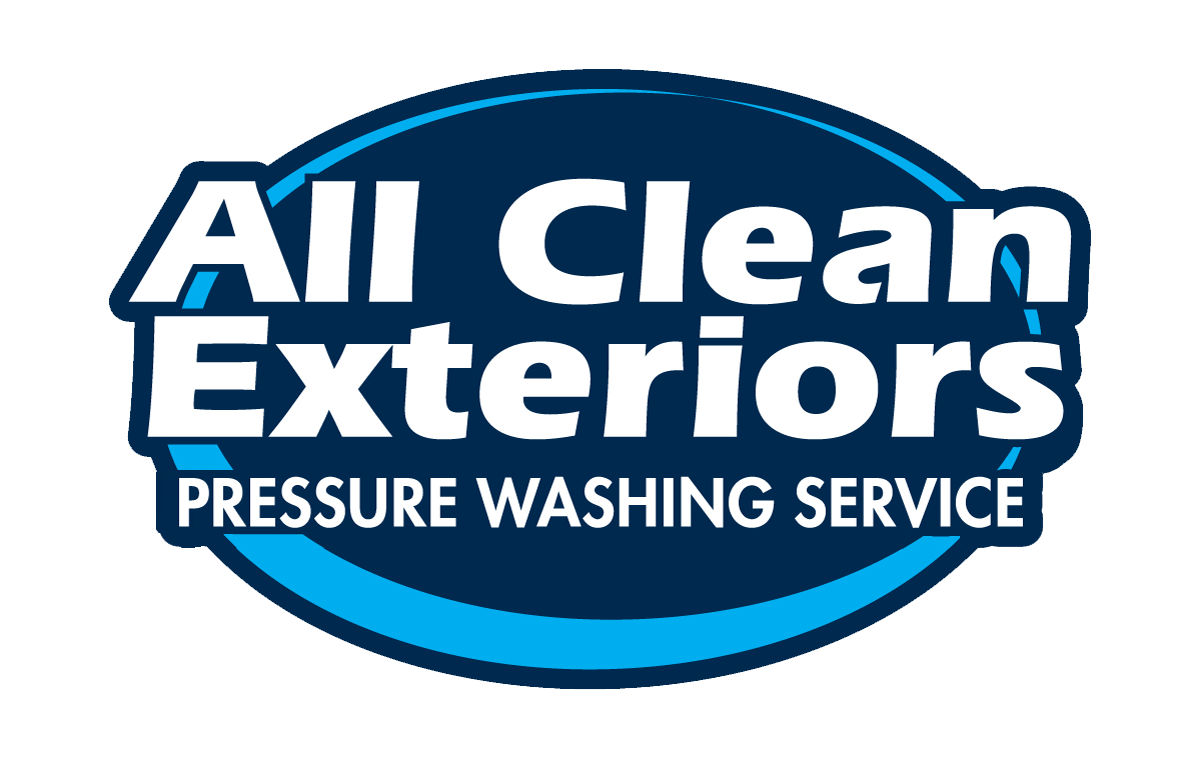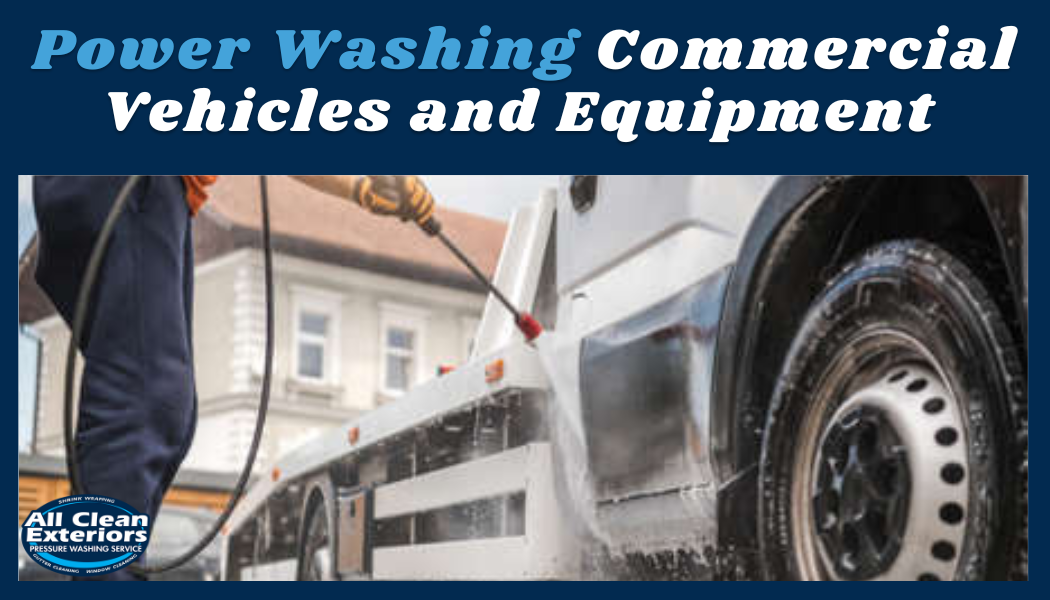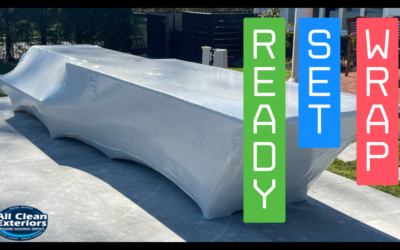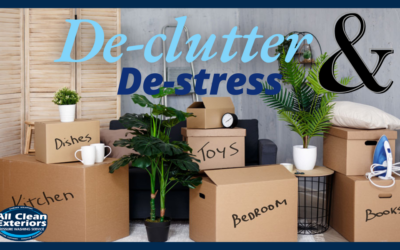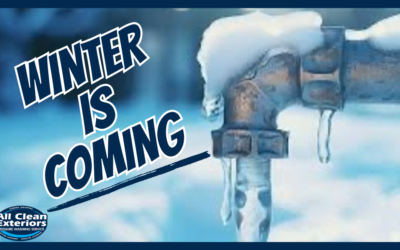Power Washing Commercial Vehicles and Heavy Equipment
Why Power Wash Commercial Vehicles?
Many people don’t understand the fundamentals. They think that power washing is strictly for concrete, stone, and other hardscape surfaces. Maybe, in some circumstances, they might see the value of power washing a building’s siding, whether vinyl, wood, asbestos, concrete, or aluminum. But a dump truck, or a backhoe, or an equipment trailer? Heck, no. Power wash a commercial vehicle? Forget about it.
Some people also think that if the equipment is used in the dirt, it’s okay for that equipment to be dirty. They think that a clean presentation – maintaining a capable and competent image – is only important for politicians and corporate types. And, okay, show business, too.
They couldn’t be more wrong. It’s actually critical for you and your business.
Best Foot Forward
Power Washing your commercial vehicles and heavy equipment is an essential part of maintaining and preserving your company’s assets. Unscheduled downtime for your physical plant and equipment can be a tremendous drain on profitability. Emergency repairs are so expensive and time consuming as to be a real life threat to your business success.
Worse yet, the damage to your brand can be significant. No client appreciates starting a project, especially after all the predictable wrinkles and delays in getting started, only to be put off again by waiting for repairs or replacement parts to arrive for unusable equipment. Gaining repeat and referred business becomes much more difficult when you’re trying to recover from a failing situation.
Find and Fix Needed Repairs Quickly
Current and imminent equipment breakdowns are far more easily diagnosed and prevented when the equipment itself is clean. Imagine trying to identify the beginnings of a pinhole or hairline crack on a greasy, dirty, crusted surface. It’s nearly impossible. Which means it’s nearly impossible to identify the coming breakdown in advance, when those expensive and brand-damaging impacts could be avoided.
So, instead of keeping your equipment productive and online, maintenance mishaps will occur and potentially go undiscovered until the issues become an actual breakdown that demands an immediate fix. This is not only costly additional and unnecessary effort that could have been avoided, it is a reputation- and brand-damaging circumstance.
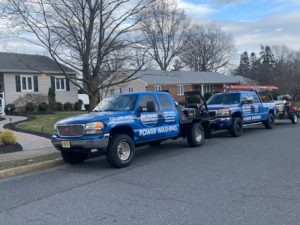
Perception Is Reality
People say that perception, what we see and perceive about the world around us, is reality. Well, we don’t completely agree, but that is pretty close to true. The impression that we form about any subject is largely dependent upon what we can see and observe. That impression, of course, is modified and “edited” by our actual real-world experience. But that sometimes comes after hard and unpleasant lessons.
The old admonition that we were taught in grade school is “don’t judge a book by its cover!”. Why did we need to hear that over and over again? Because it is just so difficult not to be influenced by appearances. So, while the well-dressed con-man will eventually show his true colors, it may require several helpings of unpleasant reality before we come to a reliable conclusion.
The opposite effect is also real. When the perception of competence and professionalism – your appearance – is supported by the reality of your performance, the beneficial effect on your brand is tremendous. You’ve also heard that “clothes make the man”, right? Well, that’s another one that is not entirely true, but difficult to deny.
While a banker or corporate executive might present themselves in a well-tailored and expensive suit to help form their brand, your business demands something different. Your impression is formed first by your personal appearance and, a close second, by the appearance of your gear and equipment. Finally and most importantly, your brand depends upon the quality of your performance. Success requires turning every variable into a plus. When you arrive at the client or job site you want your message of competent and professional performance to be reinforced in all possible ways.
Five Steps to Power Washing Commercial Vehicles and Heavy Equipment at the Job Site
Construction vehicles and heavy equipment can be cleaned at a permanent washing facility or, more conveniently, remotely at the construction site or fleet yard. Of course, remote cleaning requires more than just a power washer and some water. Today’s environmental regulations are in place to prevent contamination of the water supply with cleaning chemicals and industrial dirt. All Clean Exteriors is expert at providing remote vehicle and equipment cleaning that meets and exceeds all the appropriate federal, state and local regulations. You can depend on All Clean Exteriors to keep your New Jersey cleaning fully in compliance.
1. Set Up a Remote Washing Station
The days of connecting your power washer to a water supply and Ready, Set, Go… are over. The US Clean Water Act of 1972 and all the follow-on legislation has established minimal standards for the collection and disposal of overspray and runoff, as well as the disposal of all debris that is cleaned from the surface. All Clean Exteriors NJ will keep your cleaning operation in full compliance with all pertinent regulations.
2. Physically Remove Chunks of Debris, Clay, and Mud
Power washing construction/farm vehicles and equipment requires an additional step before washing – the removal of any visible built-up dirt and debris is an essential first step. Simply applying cleaning chemicals and detergents is ineffective, without first removing the visible and easy-to-get-at remnants and debris. All Clean Exteriors begins the process with a shovel, a pry bar, and a sharp eye to quickly remove built-up debris and allow the detergents and chemicals to do their work.
3. Application of Chemicals and Cleansers
Detergent and chemical application follows the manual first step. The work environment dictates the type and strength of cleansers to be applied, some of which are diluted to different levels determined by the surface to be cleaned and the severity of the dirt load. All Clean Exteriors is expert at selecting the appropriate cleansers for all contaminants.
4. Wash and Rinse the Equipment
Power washing the applied chemicals and thorough rinsing are needed to complete the task. Often, construction and farm equipment builds up layers of dirt, debris and residue that are resistant to simple power washing. Heavy brushing may damage underlying surfaces. These cases may require a two phased approach to cleaning, with a low-pH pre-soak followed by a high-pH power rinse. In these cases the final power rinse leaves a bright clean surface behind.
5. Inspect Our Work
Our last step is the thorough inspection of job results. The final inspection allows us to identify any missed or unfinished spots that require touchup or rework. Moreover, it allows the verification that the selected chemicals and cleansers were the best suited to the job. Lastly, a visual check can help detect and identify coming maintenance issues. Check out our Gallery and Reviews to learn more about us.
Contact us here at All Clean Exteriors NJ for more detailed information and to arrange a free estimate for your fleet and equipment. One-time or regularly-scheduled cleaning sessions are also offered.
